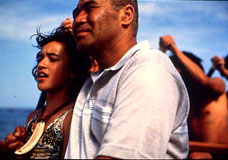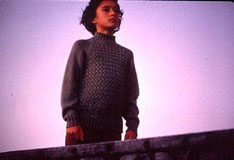|
Newest Reviews:
New Movies -
The Tunnel
V/H/S
The Tall Man
Mama Africa
Detention
Brake
Ted
Tomboy
Brownian Movement
Last Ride
[Rec]≥: Genesis
Hara-Kiri: Death of a Samurai
Indie Game: The Movie
Abraham Lincoln: Vampire Hunter
Old Movies -
Touki Bouki: The Journey of the Hyena
Drums Along the Mohawk
The Chase
The Heiress
Show
People
The Strange Affair of Uncle Harry
Pitfall
Driftwood
Miracle Mile
The Great Flamarion
Dark Habits
Archives -
Recap: 2000,
2001, 2002,
2003, 2004
, 2005, 2006,
2007 , 2008
, 2009 ,
2010 , 2011 ,
2012
All reviews alphabetically
All reviews by star rating
All reviews by release year
Masterpieces
Screening Log
Links
FAQ
E-mail me
HOME
| |
Whale Rider (Niki Caro, 2002)
 Arriving in general release after
winning an impressive trio of major film festival audience awards, Niki Caroís
soapy family drama Whale Rider
possesses so few distinguishing characteristics that ballot box stuffing seems
the most likely explanation of its previous success. Set on the eastern coast of
New Zealand, the film immerses itself in the home of a modern household of Maori
tribespeople, but lacks much in the way of exoticism until it plunges headlong
into New Age hokum. The encroaching tide of globalization threatens to expunge
the last vestiges of the Maori way of life from the planet, but the more
pressing matter for the family in the film seems to be finding an heir to become
their tribeís new chief. In the opening scene, narrator and granddaughter of
the chief Pai is born, but unfortunately her birth brings with it the deaths of
her mother and twin brother, leaving the patriarchy without an heir. Ten years
later, the situation hasnít improved. Paiís father is now an expatriate and
no new successor is likely to appear. Worse still, Paiís grandfather, the
aging chief, is desperate to find a worth chief and is deeply resentful toward
the young girl, whose birth he considers a bad omen. Though the film wants to
convince us that the culture that encourages him to foster that rage is worth
preserving, in order for it to survive, it needs to adapt, and from those
growing pains, the what little drama thatís mustered arises. Arriving in general release after
winning an impressive trio of major film festival audience awards, Niki Caroís
soapy family drama Whale Rider
possesses so few distinguishing characteristics that ballot box stuffing seems
the most likely explanation of its previous success. Set on the eastern coast of
New Zealand, the film immerses itself in the home of a modern household of Maori
tribespeople, but lacks much in the way of exoticism until it plunges headlong
into New Age hokum. The encroaching tide of globalization threatens to expunge
the last vestiges of the Maori way of life from the planet, but the more
pressing matter for the family in the film seems to be finding an heir to become
their tribeís new chief. In the opening scene, narrator and granddaughter of
the chief Pai is born, but unfortunately her birth brings with it the deaths of
her mother and twin brother, leaving the patriarchy without an heir. Ten years
later, the situation hasnít improved. Paiís father is now an expatriate and
no new successor is likely to appear. Worse still, Paiís grandfather, the
aging chief, is desperate to find a worth chief and is deeply resentful toward
the young girl, whose birth he considers a bad omen. Though the film wants to
convince us that the culture that encourages him to foster that rage is worth
preserving, in order for it to survive, it needs to adapt, and from those
growing pains, the what little drama thatís mustered arises.
 Though Whale
Rider bends over backward to convince its audience that these people are
incredibly noteworthy, the characters we meet feel just like the generic people
in every other ethnic drama and seem to have little distinctive local color
about them. There's the plucky youngster who helps the elders rediscover their
heritage, the hardheaded patriarch, the sassy grandma (ďYou can barely see
your bum in those pants!Ē), and so on. As the clan faces off against one
another is a series of stilted, somber confrontations, the movie goes through
the motions of the genre, but in focusing so intently on the little girlís
empowerment through her crowning as a figurehead leader, it places the battles
between feminism and tradition before the larger concerns that threaten the
tribe. Its mystical ending, with its copious footage of whales, is supposed to
elevate the proceedings to the realm of the fable, but instead it only further
buries any real world concerns that might have been previously unearthed. Though
itís obviously presenting a different tract, thereís no missing that it
lacks the political immediacy of Once Were Warriors, the last fictional
film featuring Maori people to make it the American theaters. Whale Rider
tries for a somber tone that it canít maintain, partly because the cute
protagonist conveys no gravity and partly because itís too frequently going
for laughs or stupid melodramatic crises. When the camera pulls in for a
close-up so that tears and the score can simultaneously well up, the movie is
simply maudlin. Though the modesty that it frequently demonstrates (thereís a
climactic childrenís talent show, for example) is admirable, it is an ill fit
with the movieís mythic overtones. Like last yearís Atanarjuat, Whale
Rider finds its roots in the folklore of the people that star in it, and I
imagine that those who enjoyed that overrated Eskimo epic will find plenty to
like here, even though the scale and sense of otherworldly wonder have been
considerably reduced. For the rest of us, itís bound to feel trivial. Though Whale
Rider bends over backward to convince its audience that these people are
incredibly noteworthy, the characters we meet feel just like the generic people
in every other ethnic drama and seem to have little distinctive local color
about them. There's the plucky youngster who helps the elders rediscover their
heritage, the hardheaded patriarch, the sassy grandma (ďYou can barely see
your bum in those pants!Ē), and so on. As the clan faces off against one
another is a series of stilted, somber confrontations, the movie goes through
the motions of the genre, but in focusing so intently on the little girlís
empowerment through her crowning as a figurehead leader, it places the battles
between feminism and tradition before the larger concerns that threaten the
tribe. Its mystical ending, with its copious footage of whales, is supposed to
elevate the proceedings to the realm of the fable, but instead it only further
buries any real world concerns that might have been previously unearthed. Though
itís obviously presenting a different tract, thereís no missing that it
lacks the political immediacy of Once Were Warriors, the last fictional
film featuring Maori people to make it the American theaters. Whale Rider
tries for a somber tone that it canít maintain, partly because the cute
protagonist conveys no gravity and partly because itís too frequently going
for laughs or stupid melodramatic crises. When the camera pulls in for a
close-up so that tears and the score can simultaneously well up, the movie is
simply maudlin. Though the modesty that it frequently demonstrates (thereís a
climactic childrenís talent show, for example) is admirable, it is an ill fit
with the movieís mythic overtones. Like last yearís Atanarjuat, Whale
Rider finds its roots in the folklore of the people that star in it, and I
imagine that those who enjoyed that overrated Eskimo epic will find plenty to
like here, even though the scale and sense of otherworldly wonder have been
considerably reduced. For the rest of us, itís bound to feel trivial.
* 1/2
06-02-03
Jeremy Heilman
|